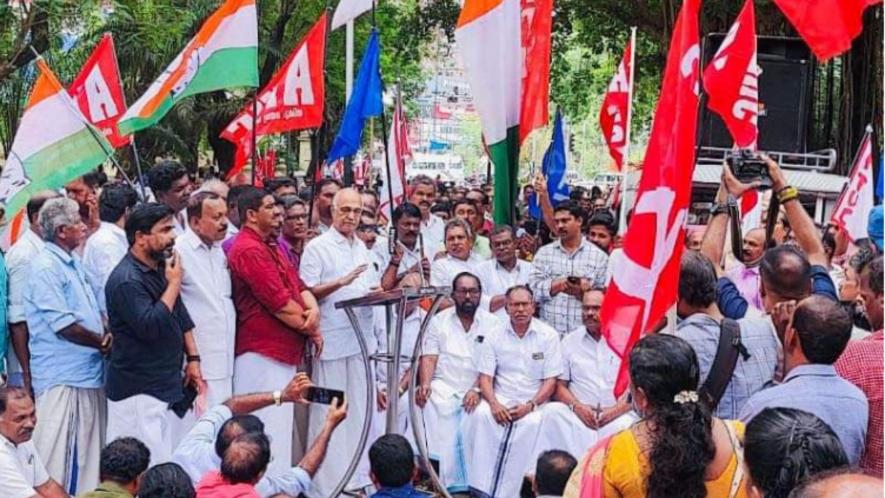Kerala: Fisher Unions Demand Withdrawal of Amendments Permitting Private Players in Sea Mining

Image: Elamaram Kareem MP, general secretary of CITU Kerala, addressing the Raj Bhavan march of the Kerala State Fishers Coordination Committee in Thiruvananthapuram (Image Courtesy: CITU Kerala)
Kerala's fishers and fish workers unions are up in arms against the draft bill to amend the Offshore Area Mineral (Development and Regulation) (OAMDR) Act, 2002. A massive March to the Raj Bhavan was held on May 6. The trade unions accused the Union government of opening up the natural resources to private players, which would have a massive negative impact on the lives of the fishing community.
The proposed mining time of 50 years, as per the draft, would have devastating impacts on the seafloor and the marine ecosystem, the unions warned. The permission to permit private players to mine the resources in the sea would only reap financial benefits for those companies winning the auctions but would end up affecting the fishing community and the ecosystem, they said.
The Kerala State Fisheries Coordination Committee has demanded the Union government withdraw the proposed amendments to save the fisherfolk's livelihood and maintain a sustainable marine habitat. The unions have accused the Bharatiya Janata Party (BJP)-led government of pursuing pro-corporate policies affecting the livelihood of several lakh members of the fishing community.
'NATURAL RESOURCES WILL BE LOOTED'
The OAMDR Act came into force in 2002 to ensure the development and regulation of minerals in the offshore areas, including the country's territorial waters, continental shelf, Exclusive Economic Zone (EEZ) and other marine areas.
The proposed amendments, made public in February 2023, have clauses included to introduce auctioning of marine blocks in different zones of the shore. The Blue Economy draft of the Union government puts the worth of mineral deposits at 138 million, black sand deposits worth $120 billion, among other resources including crude oil, construction-grade limestone, and polymetallic nodules, including manganese.
Speaking to NewsClick, Pulluvila Stanly, the national general secretary of the All India Fishers and Fish Workers Federation (AIFFWF), said, "The private players would reap billions of benefits if these amendments are implemented. This would result in severe impacts on the marine ecosystem and the lives of the fishing community.”
As per the Geological Survey of India (GSI) estimates, there are 1,53,996 million cubic metres of limestone in the Indian Economic Zone and 745 million cubic metres of construction-grade sand in the coastal waters. The plan is to utilise the rich mineral sources through modern technologies.
"The plan is to hand over the rich resources to private companies under the guise of using new technologies to tap into the resources. The available blocks will be divided into blocks of 3.43 sq kms. Mining for 50 continuous years will lead to massive gains for the private players,” Stanly said.
'DISASTROUS CONSEQUENCES'
The seas and coastal areas have been serving as the livelihood of lakhs of members of the fishing community who depend directly and indirectly on marine resources. The areas, including Wadge Bank, Koilon Bank, Chetua Bank, Ezhimala Bank, Manjapara Bank, and Mangalore Bank, are known for rich fish resources.
“These processes would have a devastating impact not only on the seafloor and benthic organisms living on the sea floor but also on all trophic levels of the marine ecosystem,” Stanly added.
To excavate different minerals deposited on the seafloor, continuous dredging would be carried out. “The dredging will increase the turbidity of the water, which harms the respiration process of the aquatic organisms and their destruction. The very survival of flora, fauna, and other aquatic life, including fish, would be under threat,” he said.
The AIFFWF has highlighted the plights of the fishing community in the event of the private players being permitted to involve in sea mining. “If the private players get control over the coastal areas, there would be restrictions on fishing and traffic, affecting the lives of the community itself. Large-scale mining would also lead to coastal erosion, destruction of fisheries and increase marine pollution,” Stanly added.
The different trade unions, including the Centre for Indian Trade Unions (CITU), All India Trade Union Congress (AITUC) and Indian National Trade Union Congress (INTUC), participated in the Raj Bhavan march, with the Bharatiya Mazdoor Sangh (BMS) staying away.
The coordination committee of the fishermen's union has demanded the Union government withdraw the amendments allowing the private companies to engage in large-scale mining
Get the latest reports & analysis with people's perspective on Protests, movements & deep analytical videos, discussions of the current affairs in your Telegram app. Subscribe to NewsClick's Telegram channel & get Real-Time updates on stories, as they get published on our website.
























